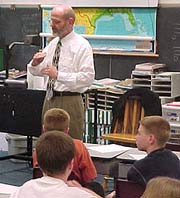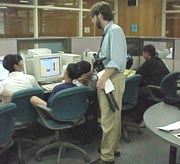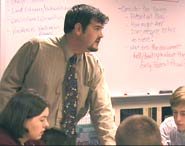The
hypermedia case studies found here portray complex episodes of classroom
life that provide teachers, both individually and collaboratively,
the opportunity to explore, investigate, and seek solutions to problems
and dilemmas of teaching for understanding and standards-based practice
in social studies.
These
four case studies are about teaching "core democratic values." The
cases were developed and constructed with the cooperation of four
Lansing area teachers and might be used to explore and investigate
various approaches to teaching about "core democratic values."
- How
would you describe the teacher's approach to teaching "core democratic
values"? Does the approach seem to be effective for enhancing
student learning? Why?
- What
problems or dilemmas about teaching "core democratic values" are
evident or not evident in these cases? What solutions would you
seek to apply toward solving these problems and dilemmas?
- What
is puzzling or interesting about what students say or write about
"core democratic values"? How could this information be useful
for improving teaching practice?
- What
role does the classroom environment created by the teacher play
in students' learning?
-
Is the use of standards evident in the teaching contained in each
case? If so, how? If not, should they be?
- How
could you adapt and use one or more of these approaches in your
own teaching?
- Are
there elements missing in these cases that could provide a more
complex landscape for exploring teaching and learning about "core
democratic values"? If so, what are they?
The
cases on this site can also serve as model for developing innovative
professional development programs at local school levels, and across
district levels. The rationale for using this model can be found
in numerous reform documents that call for teachers to take charge
of their own learning and professional development. Using this model,
teachers could construct and collaboratively study hypermedia cases
about their teaching in traditional learning environments, or in
variety of technology-mediated environments.
- Focus
on one child and develop a mini-case of what one child seems to
be doing, learning, and feeling in class over some period of time
- perhaps the whole year, or perhaps a particular lesson or unit.
- Probe
what is being "covered" in a series of social studies lessons
over several days.
- Try
to figure out what children are learning about social studies
by examining their written work and their talk in class.
-
Examine the role played by the teacher within a certain class
period, or over a longer period: What are the moves the teacher
makes? What seem to be her (his) purposes?
-
Explore and describe the "culture" of the classroom and its evolution
over time.
- Consider
whether and how key ideas from the social studies standards are
interpreted and used in the classroom.
1
Adapted from Lampert and Ball (1998). For more on using hypermedia
cases in teacher education, see Lampert and Ball's book, Teaching,
Multimedia, and Mathematics: Investigations of Real Practice,
Teachers College Press.
Case
Studies
|
 Peggy
Dunn Peggy
Dunn
2nd
Grade Class
Core
Democratic Values: Diversity & Equality
Peggy
Dunn designed instruction for her students that incorporated
the concepts of diversity and equality into activities that
spanned several days. Students explored various stations,
and used a variety of media to learn about diversity and equality.
Activities included hearing and discussing a story, interacting
with primary sources on the Internet and on CD-ROM, watching
and listening to a filmstrip, finally hearing and discussing
an historical narrative, and then completing writing activities
based on the narrative. Several of the station themes revolved
around the life of Martin Luther King Jr.
|
|
 Keith
Etheridge Keith
Etheridge
5th
Grade Class
Core
Democratic Values: All
Keith
Etheridge planned this activity with his colleague at Murphy
Elementary, Margaret Holtschlag, who, as Michigan Teacher
of the Year, was on leave from her teaching position. She
was created a program she calls "Big History" at the Michigan
Historical Center in Lansing. Keith and Margaret planned a
mini-version of this program for his students. After setting
up the activity at school in a discussion that required his
students to activate their prior knowledge of "core democratic
values," his students spent a day the Historical Center investigating
primary sources and exhibits and finding links in them to
the "core democratic values." Back in school the next day,
students engaged in a follow-up assessment activity.
|
|
 Matt
Jason Matt
Jason
8th
Grade Social Studies
Core
Democratic Values: Liberty, Justice, Equality, & The Common
Good
As
part of the planning and implementation process, Matt consulted
with a social studies educator in the MSU College of Education,
and a curator at the MSU Museum about the field study activities
outlined in the case. As a culminating activity, students
constructed an online museum where they linked Core Democratic
Values to their family and community histories. Unlike the
other cases, Matt did the videotaping and much of the photography
you will find here.
|

Matthew
Morrison
12th Grade Advanced Placement U.S. History Class
Core
Democratic Values: Federalism
Matt
Morrison's activity required students to move from station
to station where they read and collaboratively interpreted
primary sources from the Articles of Confederation period.
The lesson was designed to help students develop a better
understanding of the issues surrounding the post Revolutionary,
pre-Constitutional era leading into the actual study of the
Constitution. He first previewed the assignment with his students,
linking it to future assignments, lessons, and units.
|


 Peggy
Dunn
Peggy
Dunn Keith
Etheridge
Keith
Etheridge Matt
Jason
Matt
Jason